Emerging Issues in Hospitality: Kabul Hotel Attack Analysis
VerifiedAdded on 2023/06/03
|9
|2204
|160
Report
AI Summary
This report provides a comprehensive analysis of the terrorist attack on the Intercontinental Hotel in Kabul, Afghanistan. It begins with an overview of the attack, detailing the events and the impact on the hospitality sector. The report then delves into the legal and regulatory concerns that the attack raised, examining issues such as security protocols, risk management, and the role of government and international agencies. A key component of the report is the recommended policy draft, which outlines specific measures that hospitality governing bodies and stakeholders should consider to mitigate the risk of future attacks. The policy draft covers aspects like enhanced security measures, improved communication and coordination, and the development of comprehensive crisis management plans. The report also analyzes the involvement of various stakeholders, including the Afghan government, international organizations, and private security firms. The report concludes with a validation statement, summarizing the key findings and recommendations.
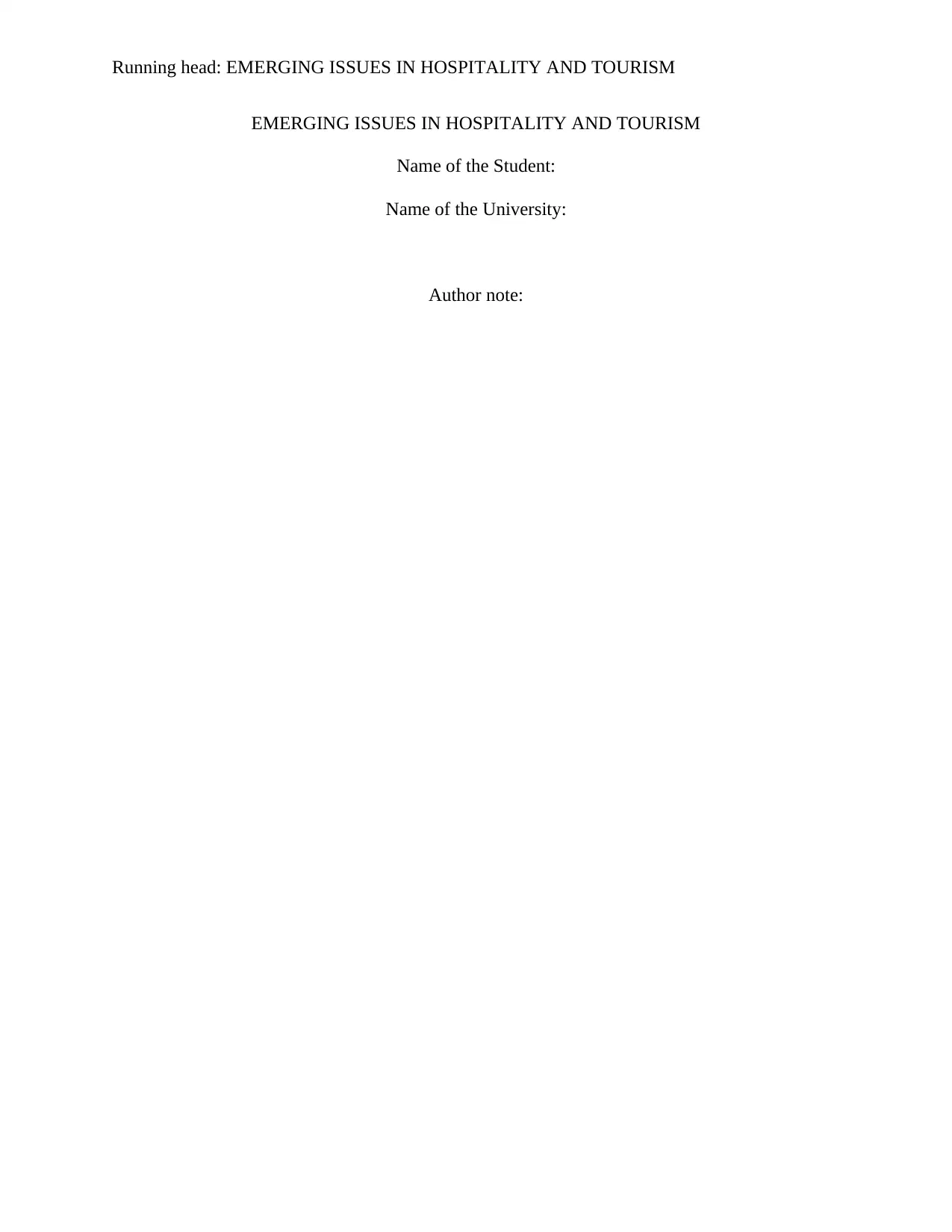
Running head: EMERGING ISSUES IN HOSPITALITY AND TOURISM
EMERGING ISSUES IN HOSPITALITY AND TOURISM
Name of the Student:
Name of the University:
Author note:
EMERGING ISSUES IN HOSPITALITY AND TOURISM
Name of the Student:
Name of the University:
Author note:
Paraphrase This Document
Need a fresh take? Get an instant paraphrase of this document with our AI Paraphraser
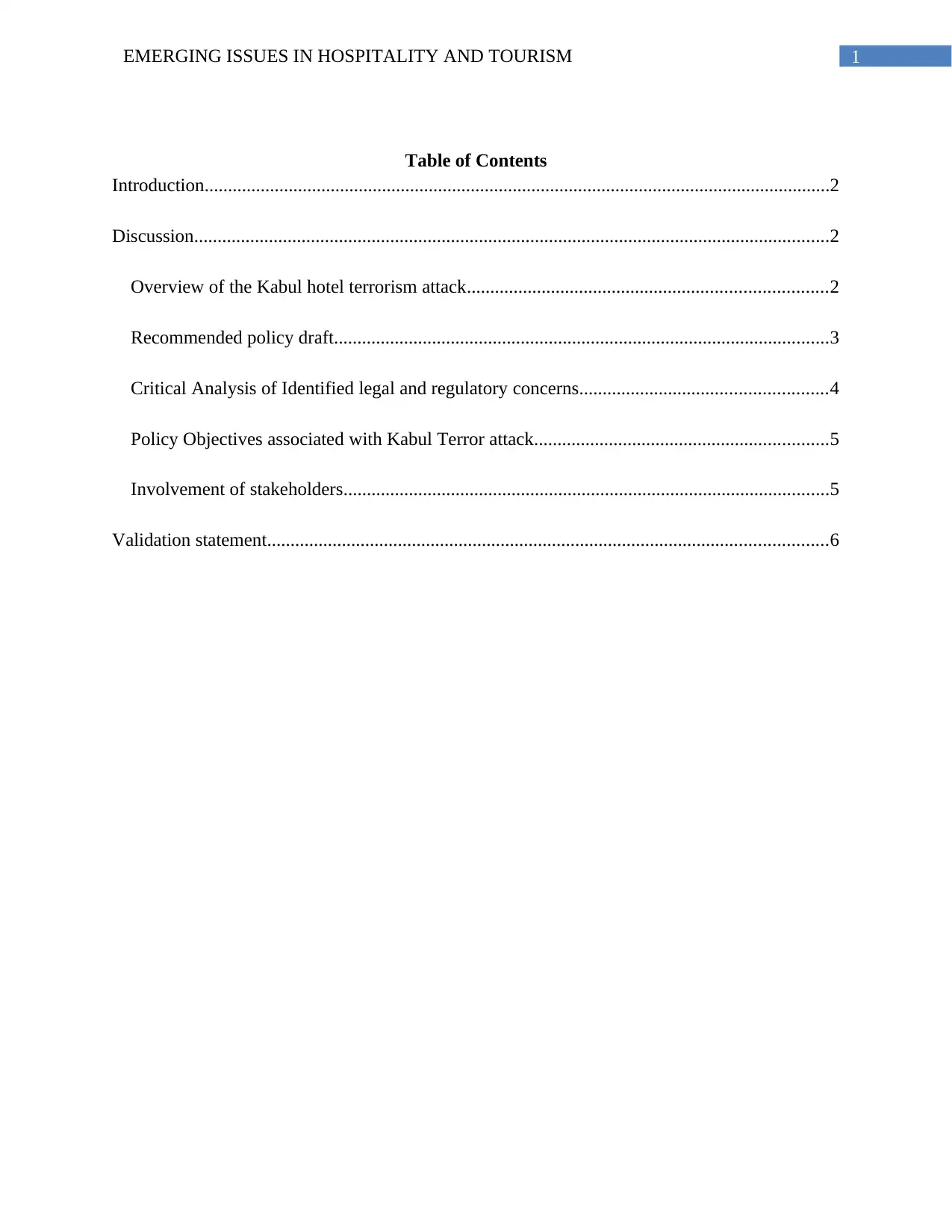
1EMERGING ISSUES IN HOSPITALITY AND TOURISM
Table of Contents
Introduction......................................................................................................................................2
Discussion........................................................................................................................................2
Overview of the Kabul hotel terrorism attack.............................................................................2
Recommended policy draft..........................................................................................................3
Critical Analysis of Identified legal and regulatory concerns.....................................................4
Policy Objectives associated with Kabul Terror attack...............................................................5
Involvement of stakeholders........................................................................................................5
Validation statement........................................................................................................................6
Table of Contents
Introduction......................................................................................................................................2
Discussion........................................................................................................................................2
Overview of the Kabul hotel terrorism attack.............................................................................2
Recommended policy draft..........................................................................................................3
Critical Analysis of Identified legal and regulatory concerns.....................................................4
Policy Objectives associated with Kabul Terror attack...............................................................5
Involvement of stakeholders........................................................................................................5
Validation statement........................................................................................................................6
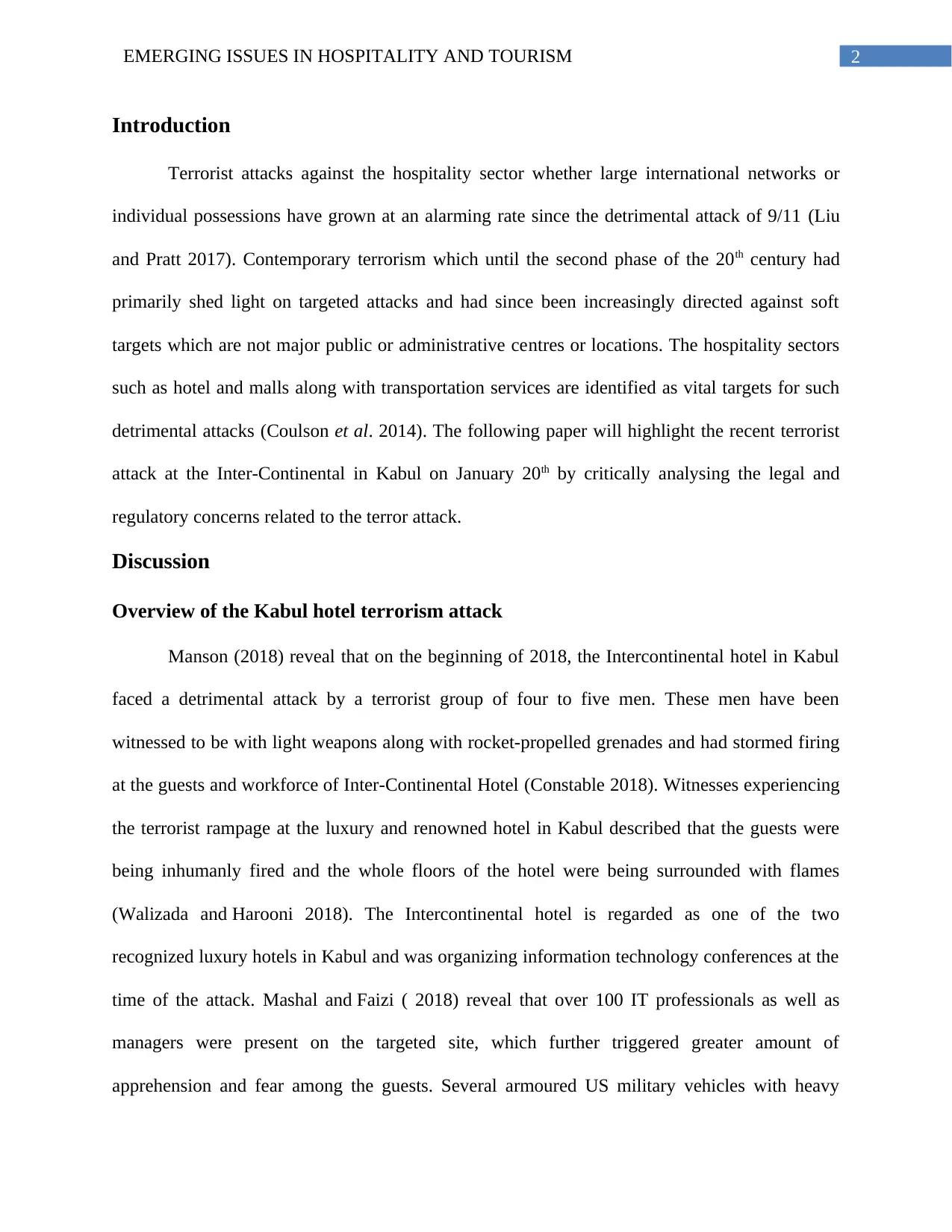
2EMERGING ISSUES IN HOSPITALITY AND TOURISM
Introduction
Terrorist attacks against the hospitality sector whether large international networks or
individual possessions have grown at an alarming rate since the detrimental attack of 9/11 (Liu
and Pratt 2017). Contemporary terrorism which until the second phase of the 20th century had
primarily shed light on targeted attacks and had since been increasingly directed against soft
targets which are not major public or administrative centres or locations. The hospitality sectors
such as hotel and malls along with transportation services are identified as vital targets for such
detrimental attacks (Coulson et al. 2014). The following paper will highlight the recent terrorist
attack at the Inter-Continental in Kabul on January 20th by critically analysing the legal and
regulatory concerns related to the terror attack.
Discussion
Overview of the Kabul hotel terrorism attack
Manson (2018) reveal that on the beginning of 2018, the Intercontinental hotel in Kabul
faced a detrimental attack by a terrorist group of four to five men. These men have been
witnessed to be with light weapons along with rocket-propelled grenades and had stormed firing
at the guests and workforce of Inter-Continental Hotel (Constable 2018). Witnesses experiencing
the terrorist rampage at the luxury and renowned hotel in Kabul described that the guests were
being inhumanly fired and the whole floors of the hotel were being surrounded with flames
(Walizada and Harooni 2018). The Intercontinental hotel is regarded as one of the two
recognized luxury hotels in Kabul and was organizing information technology conferences at the
time of the attack. Mashal and Faizi ( 2018) reveal that over 100 IT professionals as well as
managers were present on the targeted site, which further triggered greater amount of
apprehension and fear among the guests. Several armoured US military vehicles with heavy
Introduction
Terrorist attacks against the hospitality sector whether large international networks or
individual possessions have grown at an alarming rate since the detrimental attack of 9/11 (Liu
and Pratt 2017). Contemporary terrorism which until the second phase of the 20th century had
primarily shed light on targeted attacks and had since been increasingly directed against soft
targets which are not major public or administrative centres or locations. The hospitality sectors
such as hotel and malls along with transportation services are identified as vital targets for such
detrimental attacks (Coulson et al. 2014). The following paper will highlight the recent terrorist
attack at the Inter-Continental in Kabul on January 20th by critically analysing the legal and
regulatory concerns related to the terror attack.
Discussion
Overview of the Kabul hotel terrorism attack
Manson (2018) reveal that on the beginning of 2018, the Intercontinental hotel in Kabul
faced a detrimental attack by a terrorist group of four to five men. These men have been
witnessed to be with light weapons along with rocket-propelled grenades and had stormed firing
at the guests and workforce of Inter-Continental Hotel (Constable 2018). Witnesses experiencing
the terrorist rampage at the luxury and renowned hotel in Kabul described that the guests were
being inhumanly fired and the whole floors of the hotel were being surrounded with flames
(Walizada and Harooni 2018). The Intercontinental hotel is regarded as one of the two
recognized luxury hotels in Kabul and was organizing information technology conferences at the
time of the attack. Mashal and Faizi ( 2018) reveal that over 100 IT professionals as well as
managers were present on the targeted site, which further triggered greater amount of
apprehension and fear among the guests. Several armoured US military vehicles with heavy
⊘ This is a preview!⊘
Do you want full access?
Subscribe today to unlock all pages.

Trusted by 1+ million students worldwide
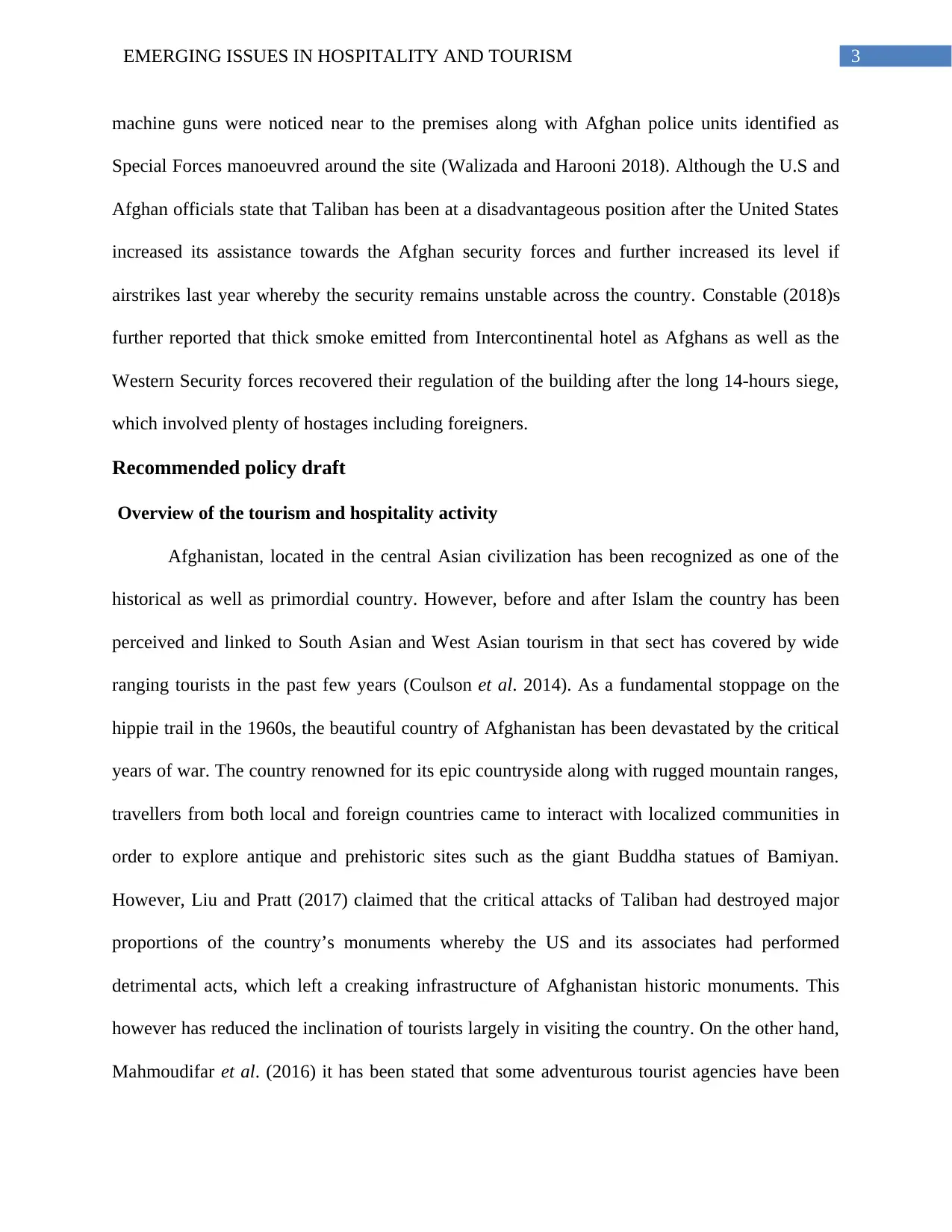
3EMERGING ISSUES IN HOSPITALITY AND TOURISM
machine guns were noticed near to the premises along with Afghan police units identified as
Special Forces manoeuvred around the site (Walizada and Harooni 2018). Although the U.S and
Afghan officials state that Taliban has been at a disadvantageous position after the United States
increased its assistance towards the Afghan security forces and further increased its level if
airstrikes last year whereby the security remains unstable across the country. Constable (2018)s
further reported that thick smoke emitted from Intercontinental hotel as Afghans as well as the
Western Security forces recovered their regulation of the building after the long 14-hours siege,
which involved plenty of hostages including foreigners.
Recommended policy draft
Overview of the tourism and hospitality activity
Afghanistan, located in the central Asian civilization has been recognized as one of the
historical as well as primordial country. However, before and after Islam the country has been
perceived and linked to South Asian and West Asian tourism in that sect has covered by wide
ranging tourists in the past few years (Coulson et al. 2014). As a fundamental stoppage on the
hippie trail in the 1960s, the beautiful country of Afghanistan has been devastated by the critical
years of war. The country renowned for its epic countryside along with rugged mountain ranges,
travellers from both local and foreign countries came to interact with localized communities in
order to explore antique and prehistoric sites such as the giant Buddha statues of Bamiyan.
However, Liu and Pratt (2017) claimed that the critical attacks of Taliban had destroyed major
proportions of the country’s monuments whereby the US and its associates had performed
detrimental acts, which left a creaking infrastructure of Afghanistan historic monuments. This
however has reduced the inclination of tourists largely in visiting the country. On the other hand,
Mahmoudifar et al. (2016) it has been stated that some adventurous tourist agencies have been
machine guns were noticed near to the premises along with Afghan police units identified as
Special Forces manoeuvred around the site (Walizada and Harooni 2018). Although the U.S and
Afghan officials state that Taliban has been at a disadvantageous position after the United States
increased its assistance towards the Afghan security forces and further increased its level if
airstrikes last year whereby the security remains unstable across the country. Constable (2018)s
further reported that thick smoke emitted from Intercontinental hotel as Afghans as well as the
Western Security forces recovered their regulation of the building after the long 14-hours siege,
which involved plenty of hostages including foreigners.
Recommended policy draft
Overview of the tourism and hospitality activity
Afghanistan, located in the central Asian civilization has been recognized as one of the
historical as well as primordial country. However, before and after Islam the country has been
perceived and linked to South Asian and West Asian tourism in that sect has covered by wide
ranging tourists in the past few years (Coulson et al. 2014). As a fundamental stoppage on the
hippie trail in the 1960s, the beautiful country of Afghanistan has been devastated by the critical
years of war. The country renowned for its epic countryside along with rugged mountain ranges,
travellers from both local and foreign countries came to interact with localized communities in
order to explore antique and prehistoric sites such as the giant Buddha statues of Bamiyan.
However, Liu and Pratt (2017) claimed that the critical attacks of Taliban had destroyed major
proportions of the country’s monuments whereby the US and its associates had performed
detrimental acts, which left a creaking infrastructure of Afghanistan historic monuments. This
however has reduced the inclination of tourists largely in visiting the country. On the other hand,
Mahmoudifar et al. (2016) it has been stated that some adventurous tourist agencies have been
Paraphrase This Document
Need a fresh take? Get an instant paraphrase of this document with our AI Paraphraser
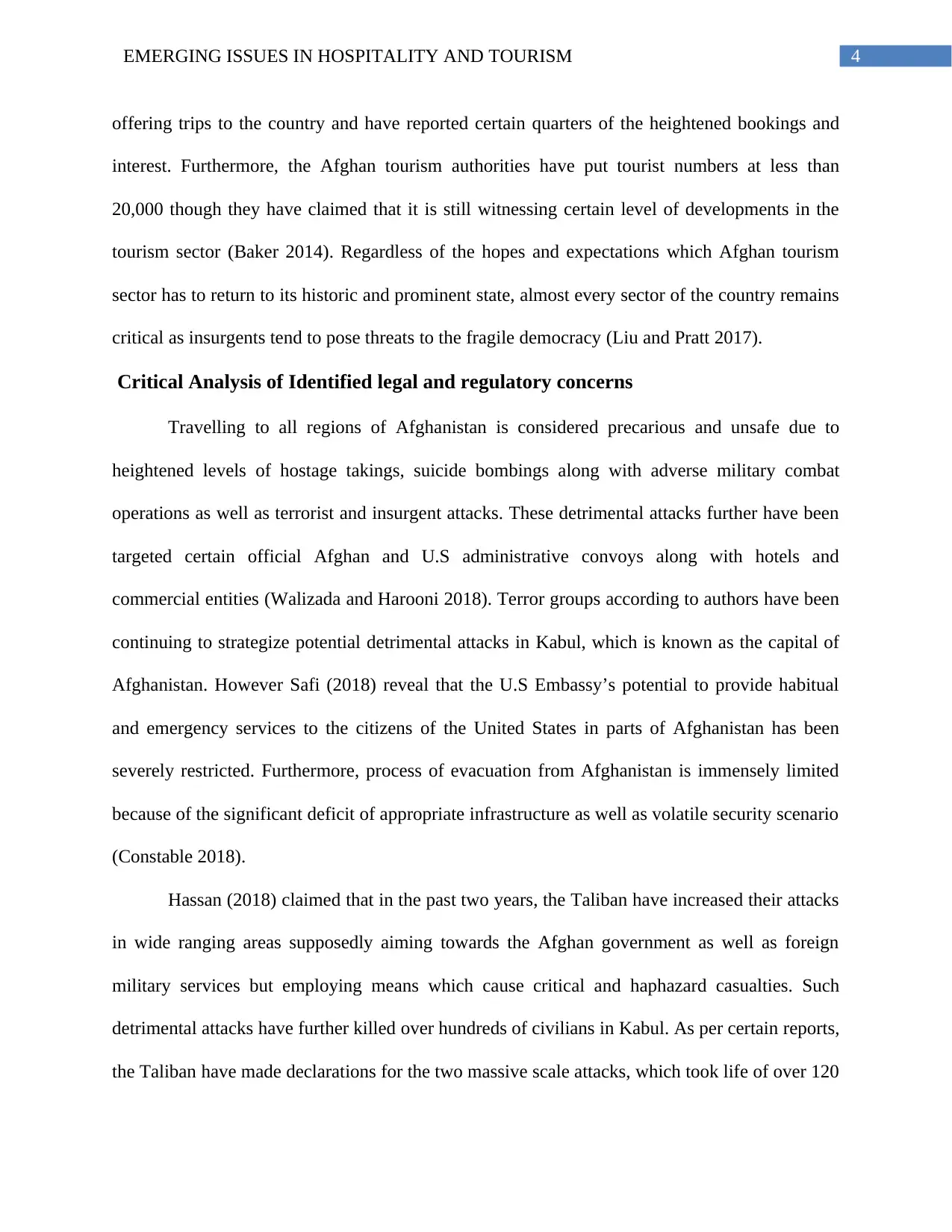
4EMERGING ISSUES IN HOSPITALITY AND TOURISM
offering trips to the country and have reported certain quarters of the heightened bookings and
interest. Furthermore, the Afghan tourism authorities have put tourist numbers at less than
20,000 though they have claimed that it is still witnessing certain level of developments in the
tourism sector (Baker 2014). Regardless of the hopes and expectations which Afghan tourism
sector has to return to its historic and prominent state, almost every sector of the country remains
critical as insurgents tend to pose threats to the fragile democracy (Liu and Pratt 2017).
Critical Analysis of Identified legal and regulatory concerns
Travelling to all regions of Afghanistan is considered precarious and unsafe due to
heightened levels of hostage takings, suicide bombings along with adverse military combat
operations as well as terrorist and insurgent attacks. These detrimental attacks further have been
targeted certain official Afghan and U.S administrative convoys along with hotels and
commercial entities (Walizada and Harooni 2018). Terror groups according to authors have been
continuing to strategize potential detrimental attacks in Kabul, which is known as the capital of
Afghanistan. However Safi (2018) reveal that the U.S Embassy’s potential to provide habitual
and emergency services to the citizens of the United States in parts of Afghanistan has been
severely restricted. Furthermore, process of evacuation from Afghanistan is immensely limited
because of the significant deficit of appropriate infrastructure as well as volatile security scenario
(Constable 2018).
Hassan (2018) claimed that in the past two years, the Taliban have increased their attacks
in wide ranging areas supposedly aiming towards the Afghan government as well as foreign
military services but employing means which cause critical and haphazard casualties. Such
detrimental attacks have further killed over hundreds of civilians in Kabul. As per certain reports,
the Taliban have made declarations for the two massive scale attacks, which took life of over 120
offering trips to the country and have reported certain quarters of the heightened bookings and
interest. Furthermore, the Afghan tourism authorities have put tourist numbers at less than
20,000 though they have claimed that it is still witnessing certain level of developments in the
tourism sector (Baker 2014). Regardless of the hopes and expectations which Afghan tourism
sector has to return to its historic and prominent state, almost every sector of the country remains
critical as insurgents tend to pose threats to the fragile democracy (Liu and Pratt 2017).
Critical Analysis of Identified legal and regulatory concerns
Travelling to all regions of Afghanistan is considered precarious and unsafe due to
heightened levels of hostage takings, suicide bombings along with adverse military combat
operations as well as terrorist and insurgent attacks. These detrimental attacks further have been
targeted certain official Afghan and U.S administrative convoys along with hotels and
commercial entities (Walizada and Harooni 2018). Terror groups according to authors have been
continuing to strategize potential detrimental attacks in Kabul, which is known as the capital of
Afghanistan. However Safi (2018) reveal that the U.S Embassy’s potential to provide habitual
and emergency services to the citizens of the United States in parts of Afghanistan has been
severely restricted. Furthermore, process of evacuation from Afghanistan is immensely limited
because of the significant deficit of appropriate infrastructure as well as volatile security scenario
(Constable 2018).
Hassan (2018) claimed that in the past two years, the Taliban have increased their attacks
in wide ranging areas supposedly aiming towards the Afghan government as well as foreign
military services but employing means which cause critical and haphazard casualties. Such
detrimental attacks have further killed over hundreds of civilians in Kabul. As per certain reports,
the Taliban have made declarations for the two massive scale attacks, which took life of over 120
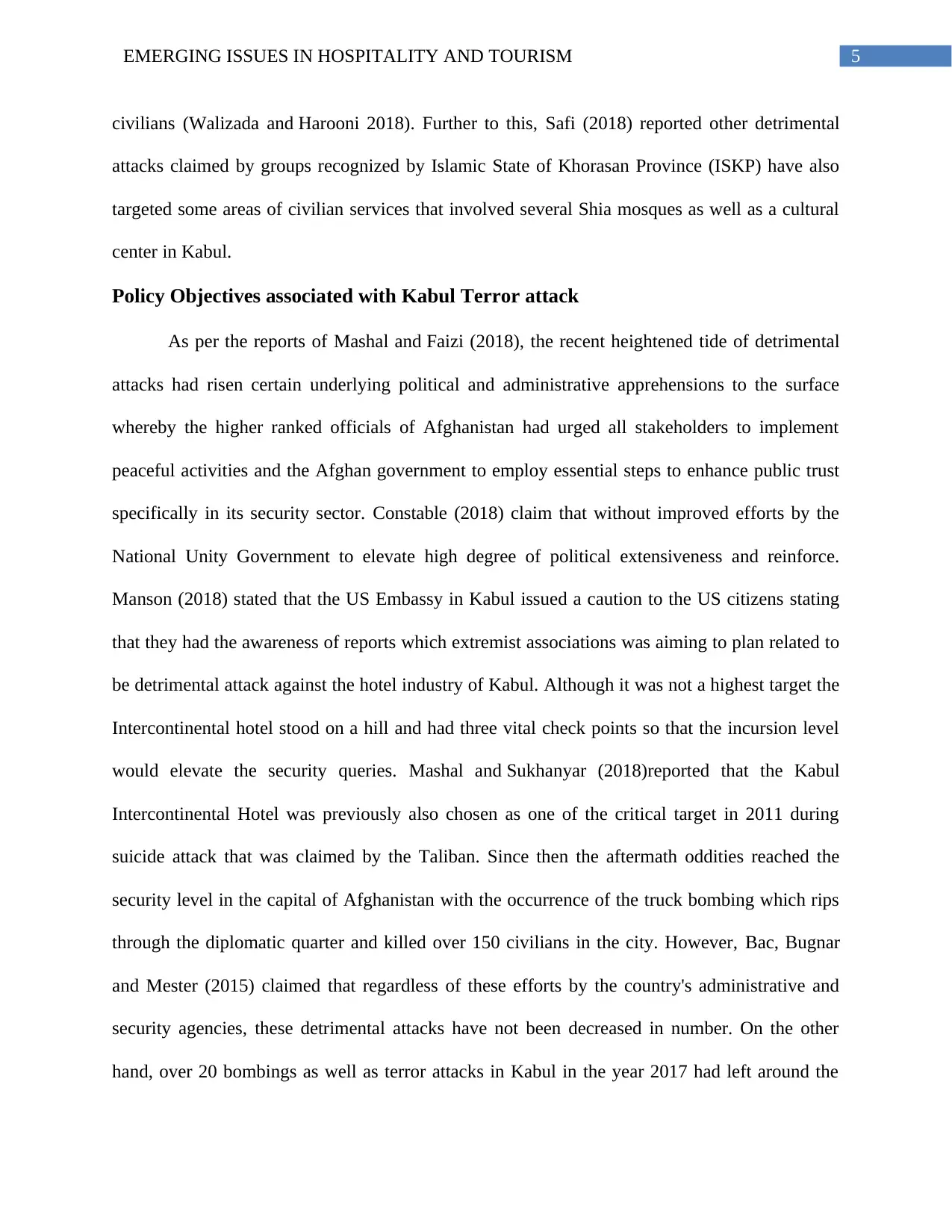
5EMERGING ISSUES IN HOSPITALITY AND TOURISM
civilians (Walizada and Harooni 2018). Further to this, Safi (2018) reported other detrimental
attacks claimed by groups recognized by Islamic State of Khorasan Province (ISKP) have also
targeted some areas of civilian services that involved several Shia mosques as well as a cultural
center in Kabul.
Policy Objectives associated with Kabul Terror attack
As per the reports of Mashal and Faizi (2018), the recent heightened tide of detrimental
attacks had risen certain underlying political and administrative apprehensions to the surface
whereby the higher ranked officials of Afghanistan had urged all stakeholders to implement
peaceful activities and the Afghan government to employ essential steps to enhance public trust
specifically in its security sector. Constable (2018) claim that without improved efforts by the
National Unity Government to elevate high degree of political extensiveness and reinforce.
Manson (2018) stated that the US Embassy in Kabul issued a caution to the US citizens stating
that they had the awareness of reports which extremist associations was aiming to plan related to
be detrimental attack against the hotel industry of Kabul. Although it was not a highest target the
Intercontinental hotel stood on a hill and had three vital check points so that the incursion level
would elevate the security queries. Mashal and Sukhanyar (2018)reported that the Kabul
Intercontinental Hotel was previously also chosen as one of the critical target in 2011 during
suicide attack that was claimed by the Taliban. Since then the aftermath oddities reached the
security level in the capital of Afghanistan with the occurrence of the truck bombing which rips
through the diplomatic quarter and killed over 150 civilians in the city. However, Bac, Bugnar
and Mester (2015) claimed that regardless of these efforts by the country's administrative and
security agencies, these detrimental attacks have not been decreased in number. On the other
hand, over 20 bombings as well as terror attacks in Kabul in the year 2017 had left around the
civilians (Walizada and Harooni 2018). Further to this, Safi (2018) reported other detrimental
attacks claimed by groups recognized by Islamic State of Khorasan Province (ISKP) have also
targeted some areas of civilian services that involved several Shia mosques as well as a cultural
center in Kabul.
Policy Objectives associated with Kabul Terror attack
As per the reports of Mashal and Faizi (2018), the recent heightened tide of detrimental
attacks had risen certain underlying political and administrative apprehensions to the surface
whereby the higher ranked officials of Afghanistan had urged all stakeholders to implement
peaceful activities and the Afghan government to employ essential steps to enhance public trust
specifically in its security sector. Constable (2018) claim that without improved efforts by the
National Unity Government to elevate high degree of political extensiveness and reinforce.
Manson (2018) stated that the US Embassy in Kabul issued a caution to the US citizens stating
that they had the awareness of reports which extremist associations was aiming to plan related to
be detrimental attack against the hotel industry of Kabul. Although it was not a highest target the
Intercontinental hotel stood on a hill and had three vital check points so that the incursion level
would elevate the security queries. Mashal and Sukhanyar (2018)reported that the Kabul
Intercontinental Hotel was previously also chosen as one of the critical target in 2011 during
suicide attack that was claimed by the Taliban. Since then the aftermath oddities reached the
security level in the capital of Afghanistan with the occurrence of the truck bombing which rips
through the diplomatic quarter and killed over 150 civilians in the city. However, Bac, Bugnar
and Mester (2015) claimed that regardless of these efforts by the country's administrative and
security agencies, these detrimental attacks have not been decreased in number. On the other
hand, over 20 bombings as well as terror attacks in Kabul in the year 2017 had left around the
⊘ This is a preview!⊘
Do you want full access?
Subscribe today to unlock all pages.

Trusted by 1+ million students worldwide
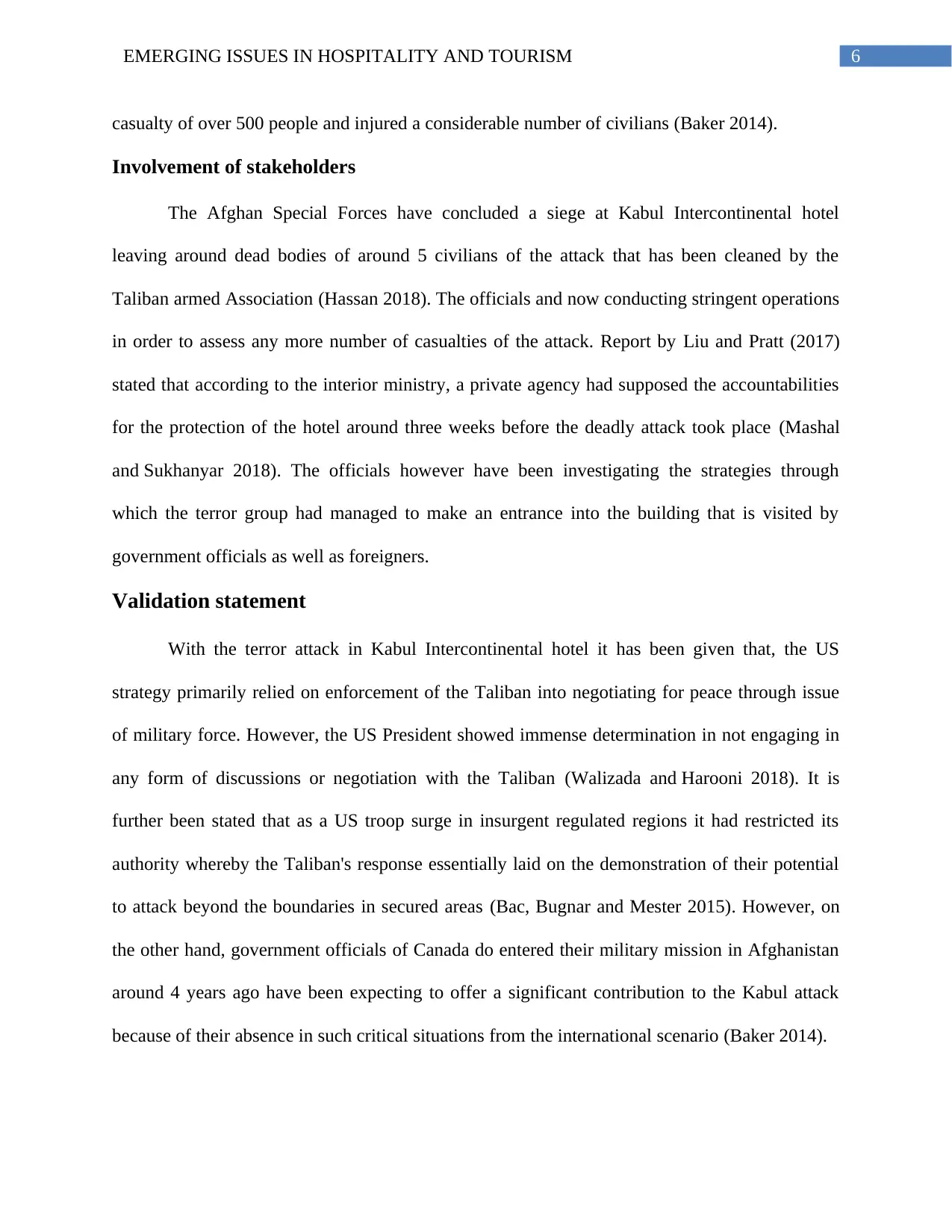
6EMERGING ISSUES IN HOSPITALITY AND TOURISM
casualty of over 500 people and injured a considerable number of civilians (Baker 2014).
Involvement of stakeholders
The Afghan Special Forces have concluded a siege at Kabul Intercontinental hotel
leaving around dead bodies of around 5 civilians of the attack that has been cleaned by the
Taliban armed Association (Hassan 2018). The officials and now conducting stringent operations
in order to assess any more number of casualties of the attack. Report by Liu and Pratt (2017)
stated that according to the interior ministry, a private agency had supposed the accountabilities
for the protection of the hotel around three weeks before the deadly attack took place (Mashal
and Sukhanyar 2018). The officials however have been investigating the strategies through
which the terror group had managed to make an entrance into the building that is visited by
government officials as well as foreigners.
Validation statement
With the terror attack in Kabul Intercontinental hotel it has been given that, the US
strategy primarily relied on enforcement of the Taliban into negotiating for peace through issue
of military force. However, the US President showed immense determination in not engaging in
any form of discussions or negotiation with the Taliban (Walizada and Harooni 2018). It is
further been stated that as a US troop surge in insurgent regulated regions it had restricted its
authority whereby the Taliban's response essentially laid on the demonstration of their potential
to attack beyond the boundaries in secured areas (Bac, Bugnar and Mester 2015). However, on
the other hand, government officials of Canada do entered their military mission in Afghanistan
around 4 years ago have been expecting to offer a significant contribution to the Kabul attack
because of their absence in such critical situations from the international scenario (Baker 2014).
casualty of over 500 people and injured a considerable number of civilians (Baker 2014).
Involvement of stakeholders
The Afghan Special Forces have concluded a siege at Kabul Intercontinental hotel
leaving around dead bodies of around 5 civilians of the attack that has been cleaned by the
Taliban armed Association (Hassan 2018). The officials and now conducting stringent operations
in order to assess any more number of casualties of the attack. Report by Liu and Pratt (2017)
stated that according to the interior ministry, a private agency had supposed the accountabilities
for the protection of the hotel around three weeks before the deadly attack took place (Mashal
and Sukhanyar 2018). The officials however have been investigating the strategies through
which the terror group had managed to make an entrance into the building that is visited by
government officials as well as foreigners.
Validation statement
With the terror attack in Kabul Intercontinental hotel it has been given that, the US
strategy primarily relied on enforcement of the Taliban into negotiating for peace through issue
of military force. However, the US President showed immense determination in not engaging in
any form of discussions or negotiation with the Taliban (Walizada and Harooni 2018). It is
further been stated that as a US troop surge in insurgent regulated regions it had restricted its
authority whereby the Taliban's response essentially laid on the demonstration of their potential
to attack beyond the boundaries in secured areas (Bac, Bugnar and Mester 2015). However, on
the other hand, government officials of Canada do entered their military mission in Afghanistan
around 4 years ago have been expecting to offer a significant contribution to the Kabul attack
because of their absence in such critical situations from the international scenario (Baker 2014).
Paraphrase This Document
Need a fresh take? Get an instant paraphrase of this document with our AI Paraphraser
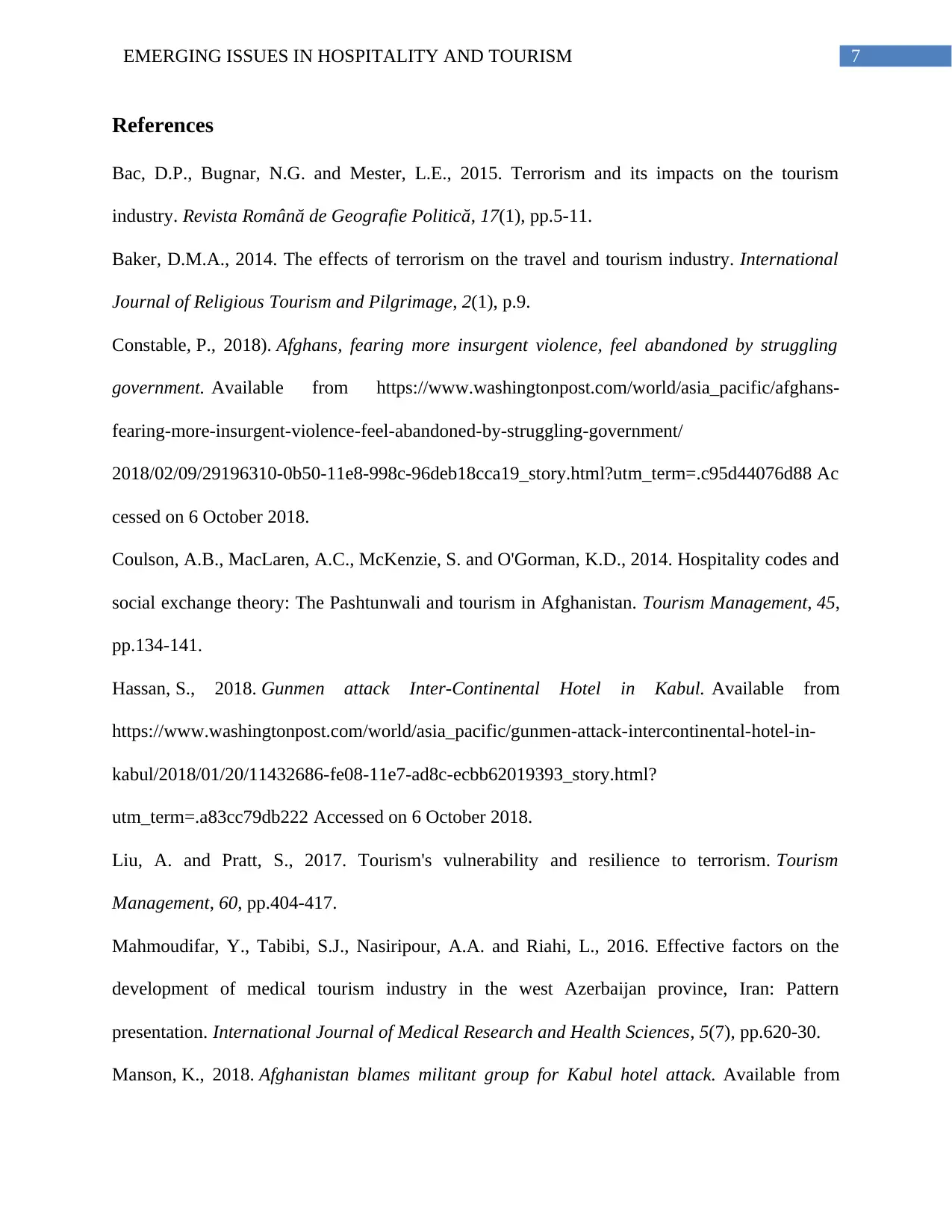
7EMERGING ISSUES IN HOSPITALITY AND TOURISM
References
Bac, D.P., Bugnar, N.G. and Mester, L.E., 2015. Terrorism and its impacts on the tourism
industry. Revista Română de Geografie Politică, 17(1), pp.5-11.
Baker, D.M.A., 2014. The effects of terrorism on the travel and tourism industry. International
Journal of Religious Tourism and Pilgrimage, 2(1), p.9.
Constable, P., 2018). Afghans, fearing more insurgent violence, feel abandoned by struggling
government. Available from https://www.washingtonpost.com/world/asia_pacific/afghans-
fearing-more-insurgent-violence-feel-abandoned-by-struggling-government/
2018/02/09/29196310-0b50-11e8-998c-96deb18cca19_story.html?utm_term=.c95d44076d88 Ac
cessed on 6 October 2018.
Coulson, A.B., MacLaren, A.C., McKenzie, S. and O'Gorman, K.D., 2014. Hospitality codes and
social exchange theory: The Pashtunwali and tourism in Afghanistan. Tourism Management, 45,
pp.134-141.
Hassan, S., 2018. Gunmen attack Inter-Continental Hotel in Kabul. Available from
https://www.washingtonpost.com/world/asia_pacific/gunmen-attack-intercontinental-hotel-in-
kabul/2018/01/20/11432686-fe08-11e7-ad8c-ecbb62019393_story.html?
utm_term=.a83cc79db222 Accessed on 6 October 2018.
Liu, A. and Pratt, S., 2017. Tourism's vulnerability and resilience to terrorism. Tourism
Management, 60, pp.404-417.
Mahmoudifar, Y., Tabibi, S.J., Nasiripour, A.A. and Riahi, L., 2016. Effective factors on the
development of medical tourism industry in the west Azerbaijan province, Iran: Pattern
presentation. International Journal of Medical Research and Health Sciences, 5(7), pp.620-30.
Manson, K., 2018. Afghanistan blames militant group for Kabul hotel attack. Available from
References
Bac, D.P., Bugnar, N.G. and Mester, L.E., 2015. Terrorism and its impacts on the tourism
industry. Revista Română de Geografie Politică, 17(1), pp.5-11.
Baker, D.M.A., 2014. The effects of terrorism on the travel and tourism industry. International
Journal of Religious Tourism and Pilgrimage, 2(1), p.9.
Constable, P., 2018). Afghans, fearing more insurgent violence, feel abandoned by struggling
government. Available from https://www.washingtonpost.com/world/asia_pacific/afghans-
fearing-more-insurgent-violence-feel-abandoned-by-struggling-government/
2018/02/09/29196310-0b50-11e8-998c-96deb18cca19_story.html?utm_term=.c95d44076d88 Ac
cessed on 6 October 2018.
Coulson, A.B., MacLaren, A.C., McKenzie, S. and O'Gorman, K.D., 2014. Hospitality codes and
social exchange theory: The Pashtunwali and tourism in Afghanistan. Tourism Management, 45,
pp.134-141.
Hassan, S., 2018. Gunmen attack Inter-Continental Hotel in Kabul. Available from
https://www.washingtonpost.com/world/asia_pacific/gunmen-attack-intercontinental-hotel-in-
kabul/2018/01/20/11432686-fe08-11e7-ad8c-ecbb62019393_story.html?
utm_term=.a83cc79db222 Accessed on 6 October 2018.
Liu, A. and Pratt, S., 2017. Tourism's vulnerability and resilience to terrorism. Tourism
Management, 60, pp.404-417.
Mahmoudifar, Y., Tabibi, S.J., Nasiripour, A.A. and Riahi, L., 2016. Effective factors on the
development of medical tourism industry in the west Azerbaijan province, Iran: Pattern
presentation. International Journal of Medical Research and Health Sciences, 5(7), pp.620-30.
Manson, K., 2018. Afghanistan blames militant group for Kabul hotel attack. Available from
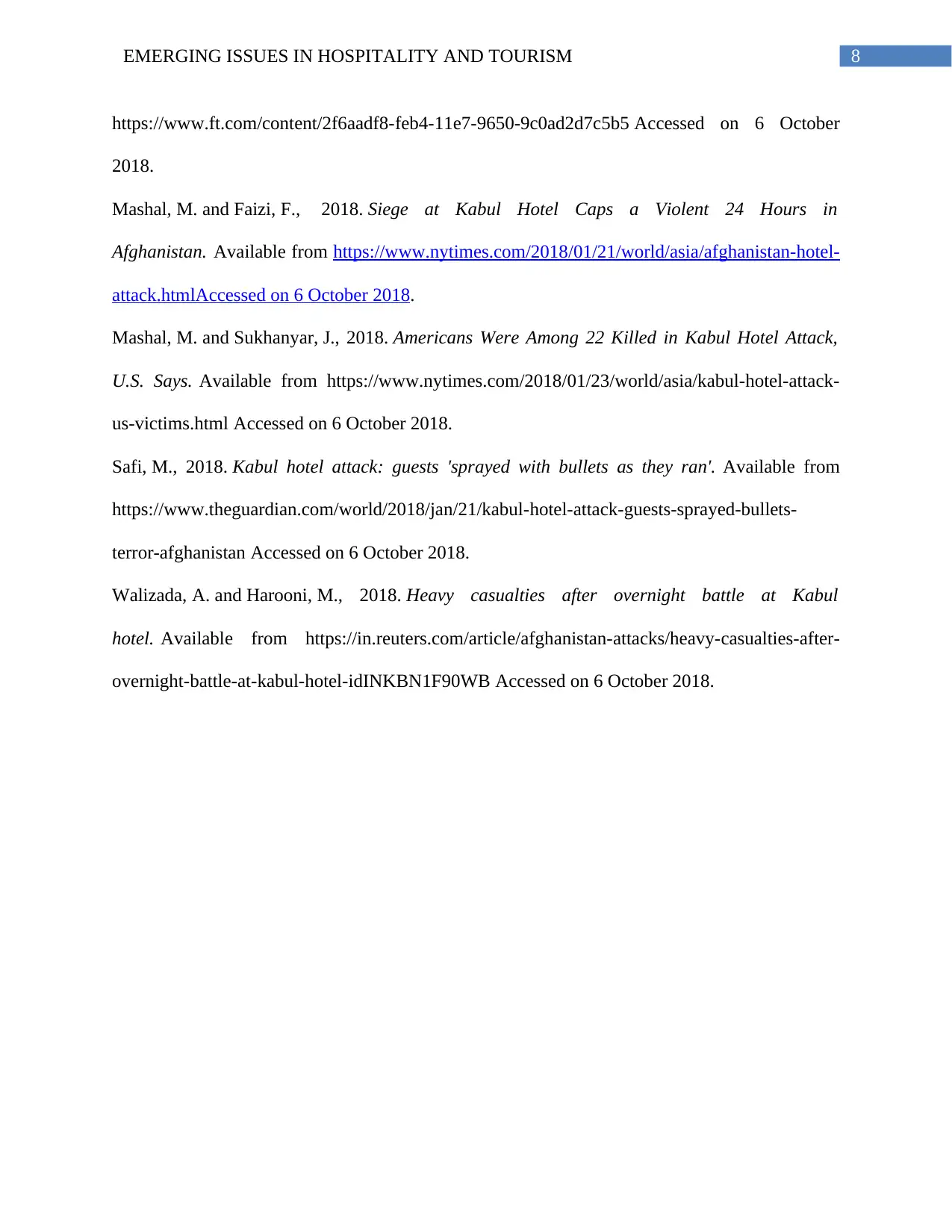
8EMERGING ISSUES IN HOSPITALITY AND TOURISM
https://www.ft.com/content/2f6aadf8-feb4-11e7-9650-9c0ad2d7c5b5 Accessed on 6 October
2018.
Mashal, M. and Faizi, F., 2018. Siege at Kabul Hotel Caps a Violent 24 Hours in
Afghanistan. Available from https://www.nytimes.com/2018/01/21/world/asia/afghanistan-hotel-
attack.htmlAccessed on 6 October 2018.
Mashal, M. and Sukhanyar, J., 2018. Americans Were Among 22 Killed in Kabul Hotel Attack,
U.S. Says. Available from https://www.nytimes.com/2018/01/23/world/asia/kabul-hotel-attack-
us-victims.html Accessed on 6 October 2018.
Safi, M., 2018. Kabul hotel attack: guests 'sprayed with bullets as they ran'. Available from
https://www.theguardian.com/world/2018/jan/21/kabul-hotel-attack-guests-sprayed-bullets-
terror-afghanistan Accessed on 6 October 2018.
Walizada, A. and Harooni, M., 2018. Heavy casualties after overnight battle at Kabul
hotel. Available from https://in.reuters.com/article/afghanistan-attacks/heavy-casualties-after-
overnight-battle-at-kabul-hotel-idINKBN1F90WB Accessed on 6 October 2018.
https://www.ft.com/content/2f6aadf8-feb4-11e7-9650-9c0ad2d7c5b5 Accessed on 6 October
2018.
Mashal, M. and Faizi, F., 2018. Siege at Kabul Hotel Caps a Violent 24 Hours in
Afghanistan. Available from https://www.nytimes.com/2018/01/21/world/asia/afghanistan-hotel-
attack.htmlAccessed on 6 October 2018.
Mashal, M. and Sukhanyar, J., 2018. Americans Were Among 22 Killed in Kabul Hotel Attack,
U.S. Says. Available from https://www.nytimes.com/2018/01/23/world/asia/kabul-hotel-attack-
us-victims.html Accessed on 6 October 2018.
Safi, M., 2018. Kabul hotel attack: guests 'sprayed with bullets as they ran'. Available from
https://www.theguardian.com/world/2018/jan/21/kabul-hotel-attack-guests-sprayed-bullets-
terror-afghanistan Accessed on 6 October 2018.
Walizada, A. and Harooni, M., 2018. Heavy casualties after overnight battle at Kabul
hotel. Available from https://in.reuters.com/article/afghanistan-attacks/heavy-casualties-after-
overnight-battle-at-kabul-hotel-idINKBN1F90WB Accessed on 6 October 2018.
⊘ This is a preview!⊘
Do you want full access?
Subscribe today to unlock all pages.

Trusted by 1+ million students worldwide
1 out of 9
Your All-in-One AI-Powered Toolkit for Academic Success.
+13062052269
info@desklib.com
Available 24*7 on WhatsApp / Email
![[object Object]](/_next/static/media/star-bottom.7253800d.svg)
Unlock your academic potential
Copyright © 2020–2026 A2Z Services. All Rights Reserved. Developed and managed by ZUCOL.
